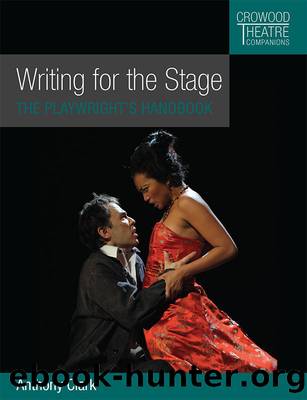Writing for the Stage by Clark Anthony;

Author:Clark, Anthony;
Language: eng
Format: epub
Publisher: The Crowood Press
Show, Donât Tell
Donât tell me the moon is shining, show me the glint of light on broken glass.
Anton Chekhov (1860â1904)
It is said that an audience will appreciate your dramatic writing more profoundly if you can get them to use their imaginations to experience what you have seen, heard, thought and felt.
Didactic speechifying by characters who know themselves too well and tell you everything they are thinking, have done and are about to do is boring. Boring because the audience is given no opportunity to interpret the dramatic action for themselves. If there is a disjuncture between what we are told about a particular situation or character and what we then see, we engage actively in searching for the truth of the drama, as we would in a real-life situation. Ambiguity may be the enemy of accountability and progress, but it engages audiences who want to go on a journey of discovery.
As has already been mentioned in Chapter 2, a large part of who we are is expressed in what we do, and characters are better defined in drama through their actions. The word drama has its origins in the Greek word âdraoâ meaning âto do, make, act and performâ.
When a character is using a monologue, or a soliloquy, to tell us what they are thinking about a particular situation, or something they plan to do or not do, or what they think about a person or group of people, as long as they are travelling with the words, by that I mean using the words to clarify their own thinking, something dramatic is happening. We will go on a journey with the character as they change.
Download
This site does not store any files on its server. We only index and link to content provided by other sites. Please contact the content providers to delete copyright contents if any and email us, we'll remove relevant links or contents immediately.
Call Me by Your Name by André Aciman(18961)
Ready Player One by Cline Ernest(12836)
How to Be a Bawse: A Guide to Conquering Life by Lilly Singh(6692)
Wiseguy by Nicholas Pileggi(4585)
The Kite Runner by Khaled Hosseini(4430)
On Writing A Memoir of the Craft by Stephen King(4213)
The Crown by Robert Lacey(4104)
Audition by Ryu Murakami(4097)
Call me by your name by Andre Aciman(4070)
Harry Potter and the Cursed Child: The Journey by Harry Potter Theatrical Productions(3960)
Gerald's Game by Stephen King(3918)
The Perils of Being Moderately Famous by Soha Ali Khan(3782)
Dialogue by Robert McKee(3582)
Dynamic Alignment Through Imagery by Eric Franklin(3488)
Apollo 8 by Jeffrey Kluger(3199)
How to be Champion: My Autobiography by Sarah Millican(3185)
Seriously... I'm Kidding by Ellen DeGeneres(3100)
Darker by E L James(3087)
History of Dance, 2E by Gayle Kassing(3000)
